What is wrong with an outdoor summer in Ireland?

The Summer holidays are nearing and the weather is getting better. Restrictions are progressively lifting and a subtle sense of normalcy is establishing itself. This return to a “normal” life involves the Irish government’s maxim of this summer being essentially “outdoors”. In the cities too, the virtues of an outdoor summer in Ireland had been praised. Many citizens of Dublin, Cork, and Galway have, over the past weeks, put these words into action, taking advantage of the favourable weather conditions to gather with friends in the cities’ streets, parks, or along canals and plazas.
The size of these gatherings has, however, not gone unnoticed. Tony Holohan, Ireland’s Chief Medical Officer, recently criticised the crowds he witnessed forming in Dublin on weekend evenings. Holohan stated that “that’s not the kind of outdoor summer we’re talking about”. City councils have started to crack down on these gatherings by, for example, periodically closing off access to the Portobello Plaza next to Dublin’s Grand Canal. It seems that officials had a different idea in mind when talking about an outdoor summer – one which disregards the life realities of those living in cities.
So, what’s an outdoor summer in Ireland?
As Micheál Martin put it some weeks back, “outdoor activities will be the theme of the summer”. Indeed, for the past few months, the notion of an outdoor summer in Ireland has been recently used by government officials to refer to the relaxing of measures in the summer. By encouraging these outdoor activities, the government wished to promote small gatherings outside. Along with other recommendations, such as staycations rather than travel abroad, these were designed as a way to prevent potential COVID transmission in crowded indoor spaces. However, it is undeniable that the notion of an outdoor summer in Ireland makes certain assumptions on the living conditions of citizens – the availability of green spaces and outdoor areas around them, most crucially.
What is the reality of the outdoor summer we have seen so far ?
Over the past couple of weeks, cities such as Galway, Dublin, and Cork have witnessed large gatherings of citizens enjoying the sunny days and the opportunity to escape the houses which they had largely been confined to during the colder months as a result of the lockdown. As has been mentioned before, these have not been welcomed by officials. Along with worries of new infection clusters, the gatherings leave behind waste – both inorganic and organic – and bring some disruptions. Last weekend in Dublin, some individuals have been arrested for clashing with the police and certain businesses have been forced to close early to avoid potentially endangering their staff.
These latter disruptions are uncalled for and will hopefully cease soon. However, it is fundamental to note that cities have been poorly prepared for the outdoor summer. It is simply unrealistic to expect that individuals living in cities will not gather in similar areas. There are only so many urban spaces that are suitable for outdoor activities. Crucially, not all of those who reside in cities have access to private gardens – in fact, a large number rely on public amenities, such as parks. To those living in rural areas or who have ready access to a private garden, an outdoor summer is entirely feasible. However, to those unfortunate ones who do not have access to such areas – i.e. many of those living in cities and especially city centres – it is much harder. These facts seem to have been largely disregarded by those who lobbied in favour of the motto of the “outdoor summer”. Additionally, they seemed to not take into account the possibility of different groups coalescing into one. The recent events have led to a number of measures by city councils across Ireland to restrict the ability of people to enjoy urban public spaces. In Dublin’s St. Stephen’s Green, for example, a popular bandstand has been sealed off to the public as a result of groups aggregating around it.
Poor Urban Planning
The reality is that an outdoor summer in Ireland entails two distinct problems when applied to cities: first, the fact that many citizens rely on public areas for any outdoor activity, and, second, that certain urban planning ought to have been done to accommodate these citizens during the summer. Cities are increasingly becoming aware of these facts. In Dublin, for example, as reported by the Irish Times, 150 new temporary toilets, as well as extra bins, will be installed to face the surge of outdoor activity this summer. However, there is little doubt as to the fact that these measures have come late – especially as outdoor dining has resumed. Only time will demonstrate their efficiency in facilitating an outdoor summer in Ireland.
The miracle solution to a reopening in the summer with a focus on activities being exercised outdoors suffers from a number of flaws, especially regarding the realities of those living in cities. Whether they will be effective is one question – whether the outdoor summer in Ireland will even be viable in cities will be shown over the coming months. One thing, however, is for certain: certain changes will have to be made or the affluence of crowds in Ireland’s cities will not stop anytime soon.